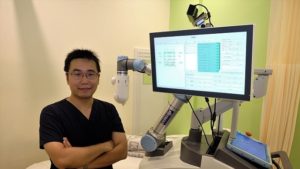 Singapore: Suffering from back pain? A robotic massage therapist developed by a Singapore-based start up may help relieve muscle strains and injuries.
Singapore: Suffering from back pain? A robotic massage therapist developed by a Singapore-based start up may help relieve muscle strains and injuries.
Emma, or Short for Expert Manipulative Massage Automation, a robotic arm with a 3D-printed massage tip, can resolve some of the challenges faced by sports therapy clinics, such as a shortage of trained therapists and a need to deliver high quality therapy consistently.
Developed by AiTreat, a start-up company founded by Nanyang Technological University (NTU Singapore) graduate Albert Zhang, Emma is undergoing user trials at a medical institution that offers sports injury rehabilitation and pain management.
“We have designed Emma as a clinically precise tool that can automatically carry out treatment for patients as prescribed by a physiotherapist or Chinese physician,” said Zhang, who graduated in 2010 from NTU.
“This is probably the first such robot in the world developed specifically for use by Traditional Chinese Medicine (TCM) physicians and sports therapists,” said Zhang.
“Our aim is not to replace the therapists who are skilled in sports massage and acupoint therapy, but to improve productivity by enabling one therapist to treat multiple patients with the help of our robots,” he said.
Emma has a user-friendly interface and recommended guidelines for various sports injuries.
The robot consists of a single, 6-axis robotic arm capable of highly articulated movements, a 3D-stereoscopic camera for vision, and a customised, fully rotatable 3D-printed massage tip.
everal safety features which work in tandem with advanced pressure sensors are also in-built, to ensure the comfort and the safety of its patients.
Emma has treated 50 patients with different conditions, such as tennis elbows, stiff neck and shoulders, lower back pain, as well as muscle pulls.
To ensure a consistent quality of therapy, Emma has sensors and diagnostic functions that will measure the progress of the patient and the exact stiffness of a particular muscle or tendon.
These detailed diagnostics are uploaded to the cloud where the progress of each patient can be analysed and generated into a performance report.
For the first time in TCM treatment, patients can accurately measure their recovery progress using precise empirical data.
